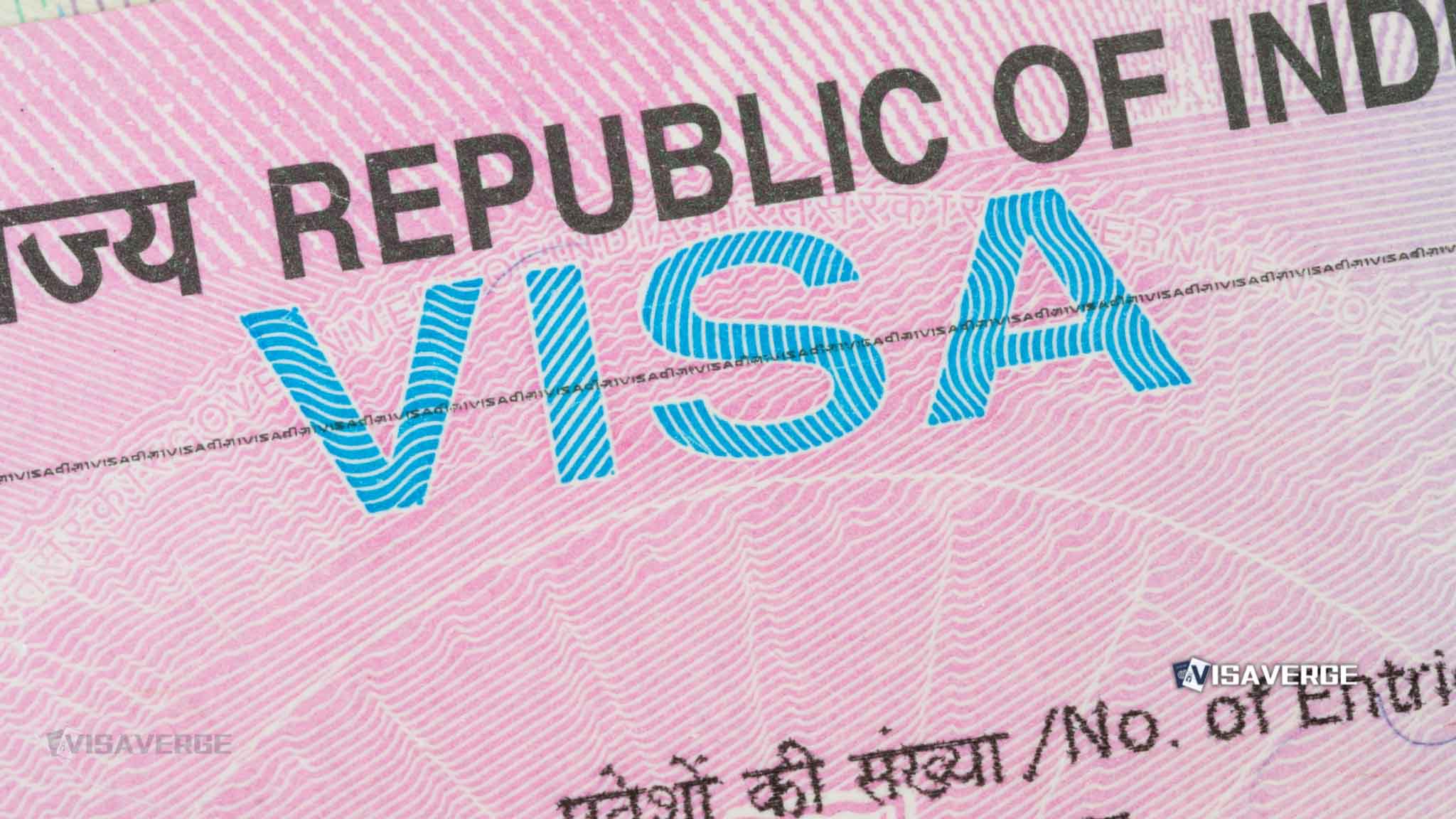Key Takeaways
• ICE warns over 69,000 Indian OPT students to update employment in SEVIS within 15 days or face termination.
• OPT students must report employment changes within 10 days or risk losing legal status and deportation.
• ICE lowered standards for SEVIS termination; failure to comply triggers automatic record termination immediately.
In late May 2025, U.S. Immigration and Customs Enforcement (ICE) sent out a wave of warning letters to thousands of international students on Optional Practical Training (OPT), with over 69,000 Indian students among those most affected. These letters warn that students who do not update their employment information in the Student and Exchange Visitor Information System (SEVIS) within 15 days will have their records terminated, putting them at risk of deportation. This sudden and strict enforcement has sent shockwaves through the international student community, especially among Indian students, who make up the second-largest group of foreign students in the United States 🇺🇸.
What Is Happening and Why Now?

ICE’s recent action is a major policy shift. In the past, students had more time and flexibility to correct mistakes or update their records. Now, ICE is enforcing a 15-day deadline for students to update their SEVIS records with current employment details. If a student fails to do this, even if they are actually working but simply forgot to report, ICE will terminate their SEVIS record. This means the student loses their legal status and could face removal (deportation) from the United States 🇺🇸.
The crackdown comes as part of a broader effort to tighten oversight of the OPT program, which allows international students to work in their field of study after graduation. According to analysis by VisaVerge.com, this move is causing widespread anxiety, especially among Indian students who rely on OPT for valuable work experience, to repay student loans, and to improve their chances of getting an H-1B work visa.
Who Is Affected?
- Indian students: Out of 270,000 Indian students in the United States 🇺🇸 during the 2022–23 academic year, about 69,000 are on OPT. This group is now at immediate risk if they do not comply with the new rules.
- All international students on OPT: In the 2023/24 academic year, there were 163,452 students on post-completion OPT and 79,330 on STEM OPT extensions, totaling 242,782 students.
- Universities and DSOs: Designated School Officials (DSOs) are responsible for helping students keep their SEVIS records up to date, but the burden is now shifting more to students themselves.
What Is OPT and Why Is It Important?
Optional Practical Training (OPT) is a program that allows F-1 visa holders (international students) to work in the United States 🇺🇸 in their field of study for up to 12 months after graduation. Students with degrees in science, technology, engineering, or math (STEM) can apply for a 24-month extension, giving them a total of 36 months of work authorization.
OPT is a key reason many students choose to study in the United States 🇺🇸. It gives them real-world experience, helps them pay back loans, and can lead to sponsorship for longer-term visas like the H-1B.
What Are the New Rules?
ICE’s new enforcement policy is much stricter than before. Here are the main points:
- 15-Day Deadline: Students who receive a warning letter must update their SEVIS record with current employment details within 15 days.
- Reporting Requirement: All OPT students must report any new job, job loss, or change in work location within 10 days, either through the SEVIS portal or by contacting their DSO.
- Unemployment Limits: Students on standard OPT can be unemployed for up to 90 days. Those on a STEM OPT extension get an extra 60 days, for a total of 150 days.
- Immediate Consequences: If a student’s SEVIS record is missing employer information or is not updated on time, ICE will terminate the record, regardless of whether the student is actually employed.
- Lower Standard for Termination: ICE no longer needs “substantial evidence” or “clear and convincing evidence” to terminate a record. Now, “failure to comply” is enough.
Why Is This a Big Deal for Indian Students?
Indian students make up a large share of those on OPT. Many have taken out loans to study in the United States 🇺🇸 and depend on OPT to earn money and gain experience. Losing OPT status can mean:
- Immediate loss of legal status
- Risk of deportation
- Loss of job opportunities
- Difficulty repaying student loans
- Reduced chances of getting an H-1B visa
The sudden enforcement has left many students confused and anxious, especially since some may not have received clear communication from their schools or may not understand the new rules.
What Should Students Do Now?
Step-by-Step Actions for Students
- Check Your SEVIS Record
- Log into the SEVIS portal or contact your DSO to make sure your employment information is up to date.
- Update Employment Information
- Report any new job, job loss, or change in work location within 10 days.
- Respond Quickly to ICE Letters
- If you receive a warning letter, update your SEVIS record within 15 days to avoid termination.
- Talk to Your DSO
- If you think your record is wrong because of a DSO error, contact your DSO right away and ask for proof of your employment status.
- Get Legal Help if Needed
- If your SEVIS record is terminated, talk to an immigration attorney to see if you can get your status back or appeal the decision.
Key Compliance Rules for OPT
| Requirement | Standard OPT | STEM OPT Extension |
|---|---|---|
| Unemployment Days Allowed | 90 | 150 (90 + 60) |
| Reporting Deadline | 10 days (job change) | 10 days (job change) |
| SEVIS Update Window (ICE) | 15 days (after warning letter) | 15 days (after warning letter) |
| Consequence of Non-Compliance | SEVIS termination, deportation | SEVIS termination, deportation |
What Are the Main Concerns?
Administrative Errors
One of the biggest worries is that even small mistakes—like forgetting to update an address or job information—can now lead to losing legal status. In some cases, DSOs have failed to update records on time, but U.S. Citizenship and Immigration Services (USCIS) has sometimes reinstated status if the error was not the student’s fault. However, with the new rules, there is less room for error.
Student Anxiety
Many students report feeling confused and stressed. The rules are complicated, and the consequences are severe. Some students say they did not get enough warning or clear instructions from their schools.
University Officials
University officials are concerned that the responsibility for compliance is shifting from DSOs to students. This increases the risk that students will make mistakes and lose their status.
Immigration Lawyers
Lawyers warn that the current enforcement is much stricter than in previous years. There is less tolerance for administrative mistakes, and students must be extra careful to follow all rules.
How Did We Get Here? A Brief History
The OPT program has been around for many years and is a major draw for international students. Under the Trump administration, there was a similar crackdown in 2020, but students had more time to fix problems and more protections. In April 2025, a draft policy gave ICE more power to terminate SEVIS records for a wider range of reasons, including going over the allowed unemployment days or having a visa revoked. The standard of proof needed to terminate a record was also lowered.
Joseph Edlow, who was nominated by President Trump to lead USCIS, has publicly called for limiting or ending post-graduation OPT. If his views become policy, OPT could be restricted to work during the degree only, removing the chance for students to work after graduation.
What Does This Mean for the Future?
Possible Policy Changes
If stricter policies are adopted, OPT could be limited or even eliminated for post-graduation work. This would make the United States 🇺🇸 less attractive to international students, especially those from India 🇮🇳 who rely on OPT for work experience and financial stability.
Continued Scrutiny
Experts expect that ICE will continue to watch OPT students closely. There could be even more enforcement and stricter rules in the future, depending on who leads USCIS and ICE.
Advocacy and Legal Challenges
Universities, NAFSA (the Association of International Educators), and legal advocates are likely to push for clearer rules and more protections for students. They may also challenge some of the new policies in court.
What Are the Practical Effects?
- Immediate risk of losing legal status for thousands of Indian students and other international students on OPT.
- Increased pressure on students to keep perfect records and report every change within strict deadlines.
- More work for DSOs and university officials, who must help students understand and follow the new rules.
- Greater need for legal help as more students face termination of their SEVIS records and possible deportation.
What Official Resources Are Available?
- USCIS OPT Information: For the latest rules and requirements, visit the USCIS OPT page.
- SEVIS Portal: Students can update their employment information directly or contact their DSO for help.
- ICE Student and Exchange Visitor Program (SEVP): Provides official guidance and updates.
- NAFSA: Offers resources and advice for both students and schools.
- Legal Assistance: Immigration attorneys who specialize in student visas can help with reinstatement or appeals.
What Should Indian Students Do Right Now?
If you are an Indian student on OPT, here are some steps you should take immediately:
- Log into your SEVIS portal and check that all your employment information is correct and up to date.
- If you have changed jobs, lost a job, or started a new job, report this within 10 days.
- If you receive a warning letter from ICE, act quickly—update your SEVIS record within 15 days.
- Keep records of all your employment, including offer letters, pay stubs, and emails with your employer.
- Stay in close contact with your DSO and ask for help if you are unsure about any requirement.
- If your SEVIS record is terminated, contact an immigration attorney right away to see if you can get your status back.
What Are the Main Takeaways?
- ICE is strictly enforcing OPT rules, especially for Indian students, with a 15-day deadline to update employment information.
- Even small mistakes or delays can lead to losing legal status and possible deportation.
- Students must be proactive in keeping their SEVIS records up to date and should seek help from DSOs and legal experts if needed.
- The future of OPT is uncertain, with possible further restrictions depending on policy changes and leadership at USCIS and ICE.
Final Thoughts
The recent ICE crackdown on OPT compliance has put over 69,000 Indian students at immediate risk of losing their legal status in the United States 🇺🇸. The new rules are strict, and the consequences are severe. Students must act quickly to update their SEVIS records and should not assume that being employed is enough—they must also report their employment on time. Universities and DSOs are urged to provide clear guidance and support, but the responsibility now falls mainly on students.
As reported by VisaVerge.com, the situation remains fluid, and further policy changes could happen depending on political developments and ongoing advocacy efforts. For now, the best advice for Indian students and all international students on OPT is to stay informed, act quickly, and seek help if needed. For more information, always refer to the official USCIS OPT page for the latest updates and requirements.
Learn Today
Optional Practical Training (OPT) → A program allowing F-1 students to work in the U.S. up to 12 months post-graduation in their field.
Student and Exchange Visitor Information System (SEVIS) → U.S. Department of Homeland Security database tracking F-1 visa holders’ status and employment.
Designated School Official (DSO) → University staff member responsible for managing students’ SEVIS records and guidance compliance.
STEM OPT Extension → A 24-month OPT extension for eligible science, technology, engineering, and math graduates working in related fields.
SEVIS Termination → An official end to a student’s SEVIS record, resulting in loss of legal status and possible deportation.
This Article in a Nutshell
In May 2025, ICE enforced a strict 15-day SEVIS update rule for OPT students, targeting 69,000 Indians. This risks termination and deportation, increasing anxiety among affected students reliant on OPT for work, loan repayment, and visa sponsorship. Legal help is crucial amid tightened OPT oversight.
— By VisaVerge.com






